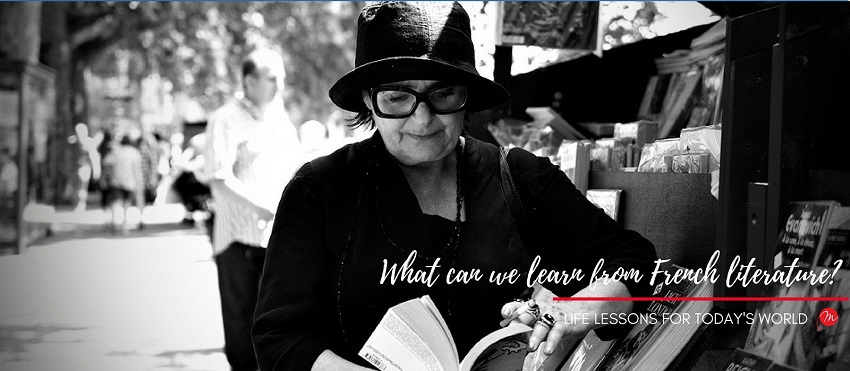Life lessons 1 to 3: French Literature – what can we learn?
In the current era of the constant barrage and chatter about ‘mindfulness’ and ‘self-development’ I decided to dig deep and see what we could learn from our elders in classic French Literature.
As a lover of the classics of French literature I found myself wondering:
What can we learn and apply to life today from the characters we love and feel that we know so well.”
If these characters were sitting by my side today, what wisdom could I take away from those conversations? This is a new Column and here are my first three life lessons in this series. Let’s see what we can learn…
1. Life lessons: Emma Bovary – Always be grateful
Emma Bovary, from the novel ‘Mme Bovary’ by Gustave Flaubert, is arguably the most famous female character of 19th century French Literature.
Emma is never fully satisfied with what she has in life: her husband is plate, boring and lacks all the passion that her books have caused her to long for, causing her to search for love in other places.
On one hand, Emma can teach us to strive to be ambitious, to not settle for mediocrity in our lives. However, another reading of Emma can cause us to believe that she will neither be happy nor grateful with what she has. It’s easy to believe that Emma will constantly be searching for the next best thing.
From a 2017 perspective, I can see Emma nowadays as the social media user, obsessed with looking at other people’s lives, the perfect lives of others, rather than being grateful for what she does have. Emma doesn’t seem to appreciate that she has a home, her health and of course a husband that arguably does truly love her.
What life lessons can we learn from Emma Bovary & her mistakes?
- Let’s exercise gratitude and not become obsessed with what we don’t have.
- Let’s not believe that what everyone, appears-to-have on social media is reality and lust-worthy.
- It’s time to seize the day and not wait around for something that may not happen. Start making these changes today.
In English – ‘Mme Bovary’ by Gustave Flaubert
En français – ‘Mme Bovary’ by Gustave Flaubert
2. Life lessons: Proust – Never forget your past
The famous unnamed narrator in Marcel Proust’s ‘À la recherche du temps perdu’ can teach us a lot about the importance of memory.
Proust’s narrator uses particular techniques to remember large sections of his past to recount to us. For example techniques such as the act of eating of madeleines and drinking of tea, and even the tripping over an out of place paving stone etc. He teaches us that memories are to be found everywhere involuntarily and that we need to capture this to remember it.
For Proust, this was done through writing. However, in 2017, we are doing this through social media, photos, and art. Although we need to appreciate the past and learn from it, we should avoid becoming obsessed with it.
What life lessons can we learn from Proust?
- Let’s take as many photos as possible and keep accounts in a diary, online or on paper, to make as many memories as possible.
- Let’s learn from the mistakes we have made in the past, to make better decisions in the future.
- However, let’s not dwell on the past.
In English – ‘In search of Lost time’ by Marcel Proust
En français – À la recherche du temps perdu’ by Marcel Proust
3. Life lessons: Maupassant – Surround yourself with positivity
Maupassant’s narrator in ‘Le Horla’ is a particular case.
It will be forever debated through his account of a ‘being’ whether he is a madman. With this aside, what we can learn from the narrator, is that being alone for a long period of time is not good for anyone. The narrator also teaches us to not become too negative, as negative thoughts become oppressive.
What life lessons can we learn from Maupassant?
- Let’s not spend too long alone, make time to make sure to socialise in between working to get that elusive French work-life balance.
- Let’s surround ourselves with positivity, to help to reduce and eliminate negative thoughts.
- It seems that a lot can be learned from the characters we find in French books, even those of another era.
In English – ‘The Horla’ by Guy de Maupassant
En français – ‘Le Horla’ by Guy de Maupassant NOTE: This series of articles was first published in 2017. Due to its popularity, the series has been republished
What are your favourite characters from the French classics? Please share any life lessons to be learned this way? Share your thoughts in the comments box below.
Image credits
- La lectrice by Sylvain Courant via flickr
- Motivational message by Thought Catelog via unsplash
- Smile by Elia Delfaria via unsplash
- Arianne by Matt Glm via unsplash
Learn more from French literature: the characters in the classics we know well
Life lessons 1-3: This article
Emma Bovary I Gustave Flaubert I Marcel Proust I Guy de Maupassant
Life lessons 4-6:
Mme de Rênal I Candide I Mâtho
Life lessons 7-9:
Lamiel | Madame Taillefer | Dr.Rieux
Life lessons 10-12:
Félicité | Julien | Hérodias











Very nice article!
I’ll add Voltaire’s Candide. Life lesson: Think for yourself!
Dear Keith,
Great minds must think alike…this is in my next column article! Stay tuned!
Candide is definitely one of my favourites, the character Pangloss never fails to make me laugh. Did you enjoy it too!?
Jessica
Yes, I enjoyed Candide. I read it in French, using the edition edited by David Ross. I found his notes very helpful in explaining the historical context. They allowed me to better appreciate Voltaire’s arguments (and occasional score-settling!)
I have to agree it isn’t the easiest without notes on Voltaire’s arguments. At university we looked at this text in the first year of study – I think the whole room was in shock during first readings of it when we were asked “Did you find the irony?” haha! It’s definitely a must read though, I felt the more I read into it the more I enjoyed it!
Such a creative idea to put together literature and lessons from its famous characters – well done!